Even before she won the Best Actress Oscar for The Blind
Side in 2010, Sandra Bullock was happy to take chances when
taking on a role. However, never in her long and varied career has
she gotten a role that is such a challenge as she has found in
Gravity.
In the film, Bullock plays Ryan Stone, a scientist and a
mother who is tapped to work on a space exploration. When a Russian
satellite explodes and the debris heads towards their ship, Stone
and astronaut Matt Kowalski (George Clooney) must fight for
survival. Then when Stone is unmoored and launched out into space
and zero gravity, she must use all her bravery and cunning to get
back down to Earth.
Bullock recently got together with director Alfonso Cuarón,
co-writer Jonás Cuarón and producer David Heyman to have a press
conference discussing the film.
What kind of
changes did you have to make in your way of thinking to convey the
physics of space properly?
Alfonso Cuarón:
Yeah, that was the biggest challenge since early on. Even before
getting into the technical solutions, when we were conceiving the
choreographies, I would bring things from the standpoint of gravity.
Of horizon and weight. It was so weird to try to. Actually it was a
whole learning curve because it’s completely counterintuitive. The
way you saw the choreography is pretty much with previz [previsualizations],
meaning animations. The problem is that draft people, people that
draw, animators, they learn how to draw based upon horizon and
weight. It was a big, big, big learning curve with experts coming to
explain the physics of Zero G [Gravity] and what would happen. You
would tell who was the new animator in the room, because he was the
guy who was completely stressed out and wanted to quit. Eventually,
it starts to become like second nature, but it was a tough one.
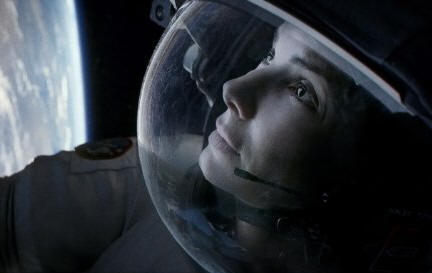 Sandra, can you talk a little bit about what you had to do
training-wise? Was it a different type of training for the spinning?
Did you do this with green screen?
Sandra, can you talk a little bit about what you had to do
training-wise? Was it a different type of training for the spinning?
Did you do this with green screen?
Sandra Bullock: Well, if there had been a green screen, it would have been
nice. There was just blackness or bright white lights or metallic
objects. Basically, what Alfonso said, you had to retrain your body
from the neck down to react and move as though it’s in Zero G,
without the benefit of Zero G moving your body. Everything your body
reacts to with a push or a pull on the ground is completely
different than it is in Zero G. So, to make that second nature just
took training and then weeks of just repetition. Then syncing it
with Alfonso’s camera and the mechanics and the mathematics of it
all. Then separating that from your head where you had to connect to
the emotion and tell the emotional story.
There were various contraptions that existed on the sound
stages. When I first saw them, you just made them your friend as
quickly and as physically as I could. If you didn’t, they were so
confusing and complex. You had to figure out how to communicate in a
language that you’re not understanding coming at you. It didn’t make
sense with my rhythms. Then going back and going, “That doesn’t make
sense. Can we musically do this? Then rhythmically I will know.” It
was such a collaborative experience.
Alfonso Cuarón: But you were very involved from early on, not only in the
animations. We were blocking and we were staging and making sure
because everything was going to be preprogrammed. What was amazing
is that you would go with your training people and have
conversations with the rigs and the stunts, and say, “Okay, what is
it exactly that you have to reinforce in your body in order to hold
this thing?” But also, with the previz, with the animations, you’d
say, “Okay, also with this motion, if I’m going to keep my arm
holding like this and floating, how much strength am I going to
need?” It was very specific the workout that you were doing.
Sandra Bullock: It’s just core strength. From a dancer’s perspective, just
making sure you weren’t going to hurt your body. You could be very
agile and flexible to maintain your body in a rig that’s load
bearing. The load is your weight for long hours of time. There’s
always going to be tweaks and things like that.
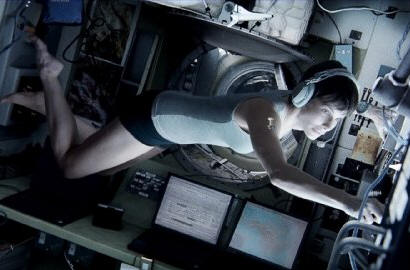 What did you think when you saw the finished film for the
first time?
What did you think when you saw the finished film for the
first time?
Sandra Bullock: The first time I saw it all put together was in Venice. I
always say, an actor, when you see yourself for the first time, you
spend all your time just watching yourself. Hating yourself and
picking your performance apart and saying, “I look horrible. I
should quit.” There was no time to pick apart one’s performance
because you were inundated with the extreme beauty and emotion that
he [Alfonso] created visually.
I hate using the word technologically because it sounds
like it’s an inanimate object. We always go to things like this.
Technology is something that’s heady. It was turned into such an
emotion and such a visceral, physical experience in this movie. I
don’t know if you saw it, but you just went I don’t how they did it
with sound. Coming here behind your head, all of a sudden you found
yourself affected in ways that you were not planning on being
affected. So, we had that same reaction. I think George and I both
did. We went, “Wow!” You can’t really speak after the film is over.
I was lucky enough in my work, career to finally be able to view a
movie I was in as it was supposed to be viewed as a newcomer.
Alfonso, can you talk about some of the challenges you
faced in terms of striking the right balance between the sound and
visual design, the atmosphere, and the storytelling?
Alfonso Cuarón: All of those are tools for the same thing. Tools to convey
the emotional journey. It’s one of those things, on their own, they
are meaningless. They can be cool, but they don’t convey the
emotions you want to do. Everything is working and functional. The
script in many ways was very solid in terms of the structure. From
the moment we finished the first draft, pretty much nothing changed
in terms of each one of the moments. Each one of the set pieces.
What changed quite a lot was with the involvement of Sandra and
George. Suddenly there was this clarity about this emotional
journey. How we were going to do it. How we were going to convey
those emotions. In many ways, that was the big hanger, if you might,
in which all these other elements start to hang from that core.
It was very strange, because as technological as this film
sounds, it was a big collaboration between artists at the end. Tim
Webber, the visual effects supervisor, I think is an artist in his
own right. Emmanuel Lubezki, the chief cinematographer, is an artist
in his own right. Everybody was trying to make life easy to the
other part, knowing that the essence of this was that emotional core
that happened with the collaboration of the actors. So, all of those
other elements were falling into that. That’s the reason why some
people... music, composer Steve Price was collaborating with the
sound designers. Usually, historically, there’s a fight between
sound designers and composers. They are always fighting. You’ll see
them in the mixing room, and they’re always fighting. The composer
wants the music to be heard and the sound designer wants the sounds
to be heard. Here, they were working together on all of this stuff.
That started early on with the selections of moods and music that
Sandra had in each one of the scenes when she was performing. It was
a very holistic process in many ways.
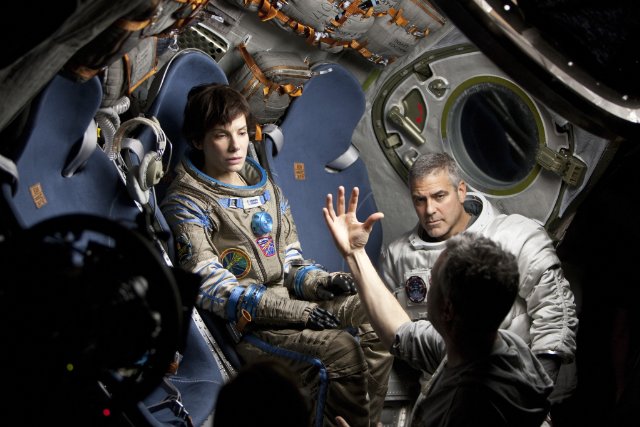 Sandra, this had to be an emotionally grueling role for
you. Was there anything you learned about yourself that you took
away from this experience?
Sandra, this had to be an emotionally grueling role for
you. Was there anything you learned about yourself that you took
away from this experience?
Sandra Bullock: Well, I’m sure. You never quite know what the change is
until one day you wake up and you go, “Wow, I’m reacting to things
differently. I feel differently.” I’ve always said that the
experience of meeting an artist that you are in awe of and you hope
to create with one day is usually disappointing. You put them up on
a pedestal, and you’re like, “Wow, that’s not a nice person.” But
the exact opposite was true in the meeting with Alfonso. I got to
meet a human being whose evolution as a human being, it was just so
bright.
Alfonso Cuarón: You mean “bean” like beans?
Sandra Bullock: (laughs) Beans? What did I say? Oh, beans. Being.
If you can’t understand Alfonso, I’m more than happy to translate. I
know it’s difficult. He is speaking English when he’s answering your
questions. (laughs) That’s from last night, isn’t it? I knew
that we were on similar evolutions, similar paths in life. How we
looked at things and events and the unknown. We didn’t really know
why we were there. You’re just going, “Okay. How do you deal with
that?” Then, we went into the technological side and we went, “Wow.
I don’t know how I’m going to pull this off.” And then, I met Jonás
and went, “Wow, his son and his co-writer is exactly the same.”
There’s a sense of calm and understanding. It always went back to
the emotion of the story. Then you meet the producer and you’re
like, oh, here comes the person you’re going to hate. There were
times when he would come over to the trailer at the end of the day,
and I knew why he was coming, where I did not like him at all.
But, all of our priorities were the same in that we were
all stepping into a completely unknown world. They had been in it
far longer than I was. I had to play catch-up. The important thing
for me was I can’t selfishly take journeys anymore because I have to
take a little boy along with me. I said, “If you make it an amazing
experience for him. Make it so I’m not somewhere not paying
attention because I’m so worried about where is he and is he having
fun. Is this a good life experience?” David turned a backlot of a
soundstage in rainy London into a wonderland for a
one-and-a-half-year-old. Everything was bumper-guarded. People would
go, “What is that?” I’d go, “That is to protect a child’s head, all
of it.” We can go through the technical aspects of working and how
you change, but there was just a level of kindness and
collaboration. I think the general sense of the unknown bonded
everyone together on such a human level. It was just... if you have
an experience that spoils you, it ruins it for a lot of other
people. I can say that that honestly happened.
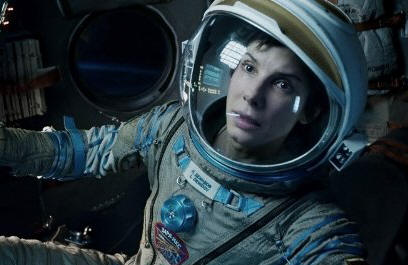 What was it like to be the only actress on screen and
perform for a great deal of the movie by yourself?
What was it like to be the only actress on screen and
perform for a great deal of the movie by yourself?
Sandra Bullock: I never thought about that. I never thought about I’m the
only person on screen. You had the story, the elements that Jonás
and Alfonso wrote. The technology was a constant character around
you. How were the visuals? I always went back to what was in their
heads that I need to honor and help execute. So I never once thought
I’m the only person because there’s George who’s a vital part of
this film. He represents life and his outlook on living. If you
don’t have that, this film could not exist. So I never thought of it
until I started doing press and everybody’s freaking me out going,
“How do you feel that this rests on your shoulders?” I’m like, “How
is it now my problem? I didn’t write this or produce it or come up
with the cockamamie idea to make a space movie.” I still don’t think
about it, because I feel like I’m third or fourth on the list of
characters before the story, the emotional visuals, the sound, the
experience of what they’ve created.
Can you talk a little bit about the research you did for
the film, the people at NASA that you talked to, and how that helped
you understand your character and what she’s going through?
Sandra Bullock: We had a lot of technicians around us that helped me
literally with knowing where buttons were in the Shenzhou and the
Soyuz. What would I do? Is this correct? I was more concerned about
body work and how it worked in Zero G and there was no one to ask.
You have people explaining, “Well, this is what happens” but I’d go,
“It’s just not registering.”
My brother-in-law was actually with a friend of his at some
wine packaging place and the guy said, “Yeah. My sister is an
astronaut.” And my brother-in-law went, “Well my sister-in-law is
getting ready to be an astronaut.” So he got my number to Katie
[NASA astronaut Catherine Coleman] who was at the ISS [International
Space Station] at the time. She called, and I was able to literally
ask someone who was experiencing the things that I was trying to
physically learn. I was able to ask her about how the body works and
what do you do? What do I need to re-teach my body physically to do
that cannot happen on Earth? We need to get the puppeteers and
everyone together on the same page. As Alfonso says, we think this
way on Earth. It’s just the oddest thing to reprogram your
reactions. So it was just a coincidental, fortuitous thing that
happened over wine that got me the final piece of information that I
needed. So, that was it.
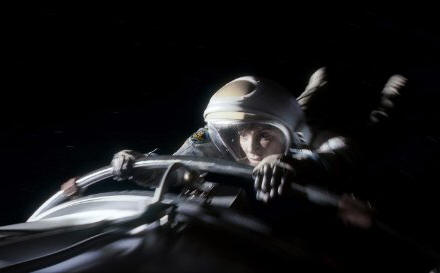 In your conversations with Katie, what fascinated you about
her job, which is one that may be even cooler than yours?
In your conversations with Katie, what fascinated you about
her job, which is one that may be even cooler than yours?
Sandra Bullock: (mock indignant) What? Take that man’s microphone
away. (laughs)
What did she tell you about the psychology of being an
astronaut and her experiences?
Sandra Bullock: I wasn’t able to have... we had one phone conversation.
Apparently, they’re not allowed to just accept calls whenever you
feel like calling the ISS. (laughs) And our work schedule was
so crazy. So our connection was always sort of ships passing in the
night. My character wasn’t an astronaut. My character wasn’t someone
who wanted and aspired to be an astronaut. All those questions were
for George. I mean, that’s the research that he had to do. My
character was just someone who happened to be in a position where it
was easier to train her to just execute this one mission and then go
home.
What I did learn from them, which was so beautiful, which
again applies to George, is just their emotional point of view on
life. Why they go up there. Why they specialize in something on
Earth. Why they want to go to space to see how it operates in space
so we all benefit from it when they get back. So, that’s more of a
George question.
Alfonso, what was your experience with the NASA astronauts?
How did that help inform what you were trying to accomplish?
Alfonso Cuarón: Well it’s very humbling because you can write a whole
fiction. You’re talking with people who have done that in real life.
Obviously, there were certain things that informed the script. Our
early draft, we have scenes that after talking with one astronaut,
we realized were absolutely moronic. There was stuff that would
never happen. Even if this film is not a documentary and it’s just a
fiction, we wanted in the frame of that fiction to make everything
as plausible and accurate as we could. Definitely the physics of
space we tried to be super accurate. But in other stuff, there are
so many technological aspects in terms of orbits and trajectories
and a lot of physics that are involved in traveling in space. We had
to take our leaps in terms of fiction.
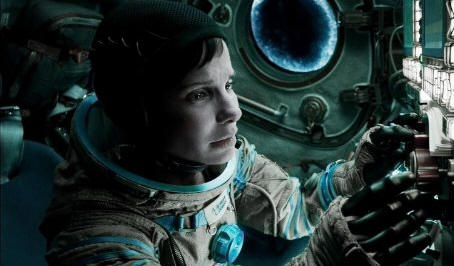 Sandra Bullock: By “leaps” he means “leaps” not “lips.”
Sandra Bullock: By “leaps” he means “leaps” not “lips.”
Alfonso Cuarón: No, I mean lips. (laughs) But as to the other
stuff, the truth of the matter is that for a big chunk of time
you’re talking with those people and you don’t care about your movie
anymore. You want to hear what they have gone through. You want all
the detail. It’s amazing. Another thing that I have to say is this
film is not a documentary, because in real life they have hundreds
of alternative procedures for each thing that happened.
If you think about it, in 40 years of space exploration,
there have been a handful of incidents. It’s been very limited.
There are missions all the time and you are going to the most
hostile place that any human has been ever. It’s because these
people are so well trained. They are not trained just to do what
they’re supposed to do. They have to have alternative thinking of
many other procedures. These people are really remarkable and that’s
something that I admire in the space program. It’s a bunch of people
that are so qualified that you just feel stupid. You feel like a
movie director. (laughs again)
Was the Spanish line that Sandra had in the movie a line
that you threw in as homage to your Mexican heritage or was that
something Sandra just improvised?
Alfonso Cuarón: (laughs) What do you think?
Sandra Bullock: He loves Mexico. (She uses the Spanish
pronunciation.)
Alfonso Cuarón: That line obviously was very funny because she just
dropped it. It used to be, “I don’t speak Chinese.” So she turned it
into “No hablo Chino.” (laughs) Oh, okay.
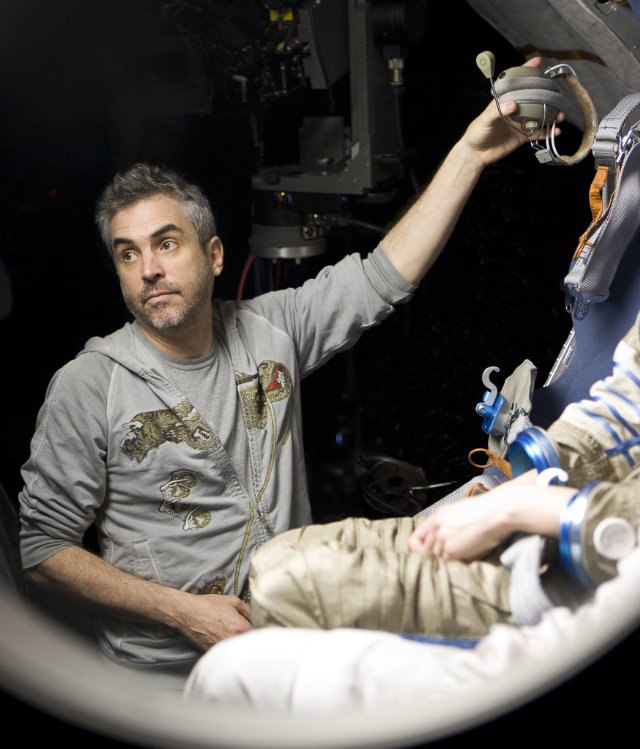 Alfonso, I read that you were inspired to write
Gravity after reading your son’s script, Desierto, about
two immigrants stranded in the desert. Is that true?
Alfonso, I read that you were inspired to write
Gravity after reading your son’s script, Desierto, about
two immigrants stranded in the desert. Is that true?
Alfonso Cuarón: Yes, when I read the Desierto, Jonás gave me
Desierto to give him notes. I read it and said, “Well I don’t
have that many notes, but I want you to help me write something like
that. ” What I mean by something like that is to write something
where you are at the edge of your seat and it’s a really tense and
suspenseful ride. He called it a roller coaster ride. But, at the
same time, it is a deep, intense, emotional ride. And interweaved
between the two of those are a lot of thematic elements that are
told through visual metaphors. Yes, I asked him to please help me do
something like that.
How was it working together?
Jonás Cuarón: Working with him was a great experience because we had
this conversation about doing a movie in this style and finding a
way. It is a big challenge on the one hand to have the non-stop
action element and be able to juggle themes. The biggest challenge
was to also engage the audience on an emotional level. That never
really came to happen until we started working with George and
Sandra also.
For me, I learned a lot from my dad and also from George
and Sandra, because that’s when I figured out how a character can
come to life. It’s a movie that was a huge gamble. I’m glad she
didn’t notice, but it was a huge gamble because the whole movie was
on this character’s shoulders. It was really impressive to see how
both on paper and in the collaboration and then also on screen she
manages to really engage the audience for 90 minutes.
Alfonso Cuarón: The rest of the experience was just two writers working
together.
Sandra Bullock: And if I can just also say, Jonás, there’s a complimentary
film piece that he did which if you saw the film, there is there’s a
moment where I’m speaking to Earth. The character’s name is Aningaaq
[voiced by Orto Ignatiussen]. He’s an Inuit. He went there and shot
this absolutely beautiful complimentary piece of loneliness and
emptiness on Earth where this man is calling from. It’s so beautiful
that I get goosebumps thinking about it, and hopefully, you’ll be
able to get to see it. Again, it’s apple/tree. The talent is just
overwhelming. It’s a beautiful piece that complements what happens
in the film, and you just get a little gift later on. It’s
beautiful.
Will it be on the DVD perhaps?
Sandra Bullock: I don’t know. (smiles) Warner Bros. doesn’t consult
me on that.
Alfonso Cuarón: (laughs) Yes, it will be on the DVD.
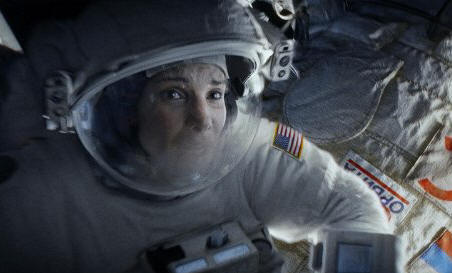 Sandra, you had to go to some pretty dark places as a mom
in this role. Was that difficult for you to film?
Sandra, you had to go to some pretty dark places as a mom
in this role. Was that difficult for you to film?
Sandra Bullock: Oh yeah. No one wants to think about that. I just kept
thinking what a strange job. Who is young [and] goes "I want to do
this for a living?" (laughs) But, yeah, if I personally can’t
feel it, I can’t do it. I kept having to say in the beginning, “What
would I do?” I realized I might be far worse off than she is. So,
you just have to go there and know that at the end of the day you
can unplug. You can go home and do something that a lot of parents
can’t or people who were parents can’t.
We’ve seen you in
Heat and The Blind Side and so many different
films, but one of the great surprises of this movie is how
unexpected it is to see you in this kind of a role. What was your
reaction when you got offered it?
Sandra Bullock: I was always longing to do emotionally and physically what
my male counterparts always got to do. I just felt envious every
time I saw a movie that I was in awe of. It was usually a male lead,
and those kinds of roles weren’t available. They weren’t being
written. So, whether it was by us searching for something and
turning it into a female character or developing it yourself, you
weren’t seeing it.
But, in the last couple of years, things have shifted. You
mentioned Heat and that’s one thing. Then the fact that Jonás
and Alfonso wrote this specifically as a woman. It wasn’t an
afterthought. It was an integral part of the story. It’s... I don’t
want to say revolutionary, but it’s revolutionary. The fact that a
studio on blind faith would fund something as unknown as this is
revolutionary. So, to be able to be the person to do it is beyond
humbling. It made you realize I have to step up and be the best
version of myself so whatever is asked of me I can produce. So yes,
every day I’m so grateful. So grateful.
For David, I understand this is your first film since the
Harry Potter movies, and Warner Bros. and JK Rowling just said
they’re going back to doing that. Will you be producing those?
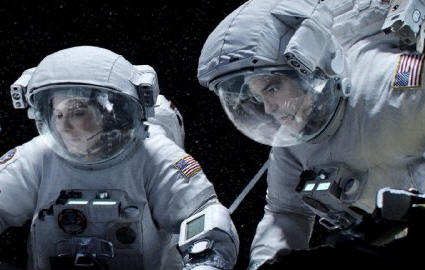 Sandra Bullock: I’ll answer [for him]. David is excited about being
involved in the next Harry Potter series, as much as they
will have him. We’ll see. Again, Warner Brothers doesn’t consult any
of us. (laughs) No... he will answer that properly.
Sandra Bullock: I’ll answer [for him]. David is excited about being
involved in the next Harry Potter series, as much as they
will have him. We’ll see. Again, Warner Brothers doesn’t consult any
of us. (laughs) No... he will answer that properly.
David Heyman: Sandra answered the question perfectly. (She laughs.)
I can’t talk about it right now. All I can say is it’s great. Jo had
no need to go back to this universe. The world of... it’s not
Harry Potter, per se, but the world of Harry. She’s
chosen to do so because she felt a need to tell a story. That she’s
doing it means it’s going to be very, very special.
For Alfonso and Jonás, there isn’t a single wasted moment
in this film. Time has a real presence in this. Why tell the story
in such an economical way? It’s a very short narrative? Why not give
more space and time to it?
Jonás Cuarón: The main idea that we had in the beginning was to do this
kind of stripped down narrative where there would be a non-stop
pace. In that way we would manage to engage the audience on that
emotional and thematic level. The idea behind it is that when you
engage the audience on such an instinctive, almost adrenalin-like
journey, you’re connecting more directly with them. It becomes like
a cathartic therapeutic experience working with the adversities that
the character, Ryan, is going through. Obviously, the audience
hasn’t experienced that, but they can project their own experiences
into that journey.
Alfonso Cuarón: Yes, that’s what Jonás kept on saying, that it was about
the audiences using their own emotional experience to partake in the
journey with the characters. He was always saying it was visceral
and primal and to keep everything just like that. And he was a pain
like that, I have to say. He looks like a very nice boy, but every
time I tried to expand on stuff, he pretty much accused me of being
old (laughs), but in a very nice kind of way.
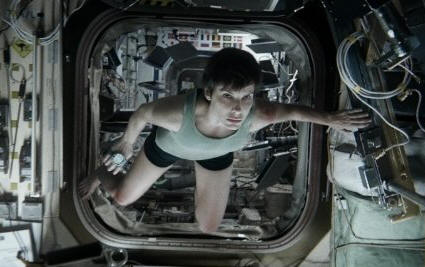 For Sandra, sound is so important, but your voice is one of
the most reassuring things while watching the film because it
carries us through this journey in such a specific way. How did you
reach that emotional level?
For Sandra, sound is so important, but your voice is one of
the most reassuring things while watching the film because it
carries us through this journey in such a specific way. How did you
reach that emotional level?
Sandra Bullock: Alfonso and I talked a lot about the voice. It’s very
specific the voice and the breadth. Where in the register is her
voice as it’s someone who’s that cut off? If I went a little higher
pitched in my panic, it always rang false. Unless it was absolutely
perfect for that moment, we always went back going, “Next time let’s
do it in that other register and try and stay there.” Then, the
breath was always followed and where the level of hyperventilation
was at that moment. Then, back in ADR again. Can we go back through
with a fine tooth comb and find any false tones in the voice, any
breaths that are not connected? Are they too fast? Should we slow
them down to match? There was a lot of time spent on that.
I mean, the meticulousness with which you were allowed to
work on this movie is unheard of. So we were always able to go back
and say, “I don’t know why, but it just didn’t feel right. Can we go
back and just try other levels with the voice?” We always wanted to
give her a voice based on her experience and where she was in life.
So it was unapologetically cut off and monotone much like my own
(laughs), but very distinctively her.
Alfonso Cuarón: But the detailing Sandra took the whole thing from
mapping. Yeah, I would be involved with her, but at the end, she was
driving the boat of mapping up the breaths because a lot of that was
about breathing and the tone of voices. Then, how we shot it. We
kept on being very aware of how we were shooting it. Then, when we
put it together to see exactly where we needed to model it. And
yeah, we had disagreements. Sometimes I said, “But I think here
there should be more panic.” She’d say, “I’m not a damsel in
distress.” I’d say, “No, it’s not about being a damsel in distress.
If I was up there in that situation, I would be screaming.” She
said, “Yes, but you’re a wimp.” (They all laugh.) So, end of
conversation.
David Heyman: Can I just say, the other thing when you talk about
Sandra’s performance that I think is remarkable is how much of it is
done through her eyes. Actually, for a huge portion of the movie,
what you’re seeing is this [points to the eyes]. There’s not a body
or a gesture that can reflect sadness or weight or whatever it may
be. It’s not the physical. You don’t have the physicality with which
to express these things. It was her eyes. Those eyes are behind a
visor. And yet, she tells the whole story. I think that was amazing.
Alfonso Cuarón: I agree.
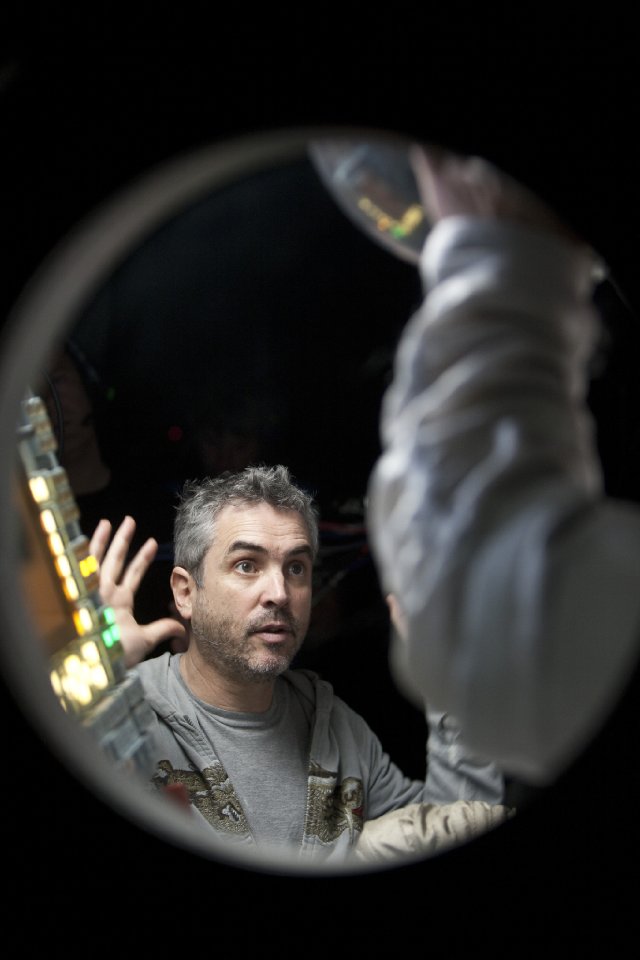 Was it a conscious decision not to show us the people on
the ground who are just as involved?
Was it a conscious decision not to show us the people on
the ground who are just as involved?
Alfonso Cuarón: The thing is that would break out of the almost
existential experience that you get with your character. You can see
this film as just a big metaphor. Forget about space. This is a film
about a woman who is drifting into the void. It’s a woman who is a
victim of her own inertia. It’s a woman who lives in her own bubble.
And that confronts all these adversities. All these adversities just
bring her farther and farther away from human connection and farther
and farther away from a sense of life and living.
All these other elements are voices. Voices that are part
of her own psyche, that represent that search for life. Even as she
is despairing, there is that part of her brain that can be telling
her, “I’m giving up.” There is something that makes the species keep
on going. Life keeps on going. It is this search for life. In many
ways, you can say that it’s a metaphor for just an internal journey
of a woman, but instead of having this story take place in a city,
in an apartment, with other adversities, it’s in space.
There’s a common history between the protagonist in this
and the protagonist in
Children of Men and how they use the adversity they’ve encountered
in their lives as a jumping off point for finding hope in a hopeless
universe. Do you view the films as linked? Could you have done this
without doing Children of Men?
Alfonso Cuarón: (laughs) Well, it’s hard to tell because life just
happened like that. Both are road movies. One is in space and the
other one is on Earth. I don’t know. I really don’t know. One film
happened first. It’s life. Your actions and your experiences start
to shape your moments and your decisions. Yes, obviously, I wouldn’t
have been able to do this before Children of Men because the
process of Children of Men took me also on a journey of
personal adversities.
The point of departure when we started working with this
screenplay, was I was in the midst of one of those periods in my
life where everything is an adversity. When I started working with
Jonás and we decided to do this film about space and stuff, we
talked about the theme as adversities and the possibility of a
rebirth. In other words, maybe I was clinging to the film with the
hope that there was going to be an end to those adversities and a
rebirth. A rebirth meaning new knowledge. So, in that sense, I think
it would have been impossible just because of the experience I have
from other films.
CLICK HERE TO SEE WHAT SANDRA BULLOCK HAD TO SAY
IN 2006!
Email
us Let us know what you
think.